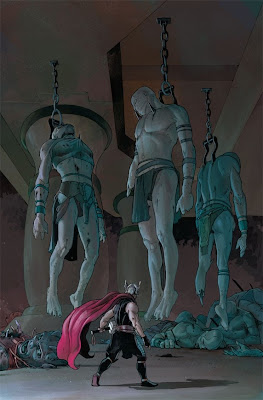written by Jason Aaron
art by Esad Ribic
Gods are disappearing. Faith has fallen into disbelief. The truth of the gods is now little more than stories for children in the minds of their once loyal peoples. It may be as the librarian of Omnipotence City explains to the unexpected researcher Thor, "Gods come and go, Son of Odin. Such is the way of things and one group never much cares what has become of the other. Why someday even the great Thor himself may be forgotten. Let us hope so at least" (The God Butcher: 48 [Thor: God of Thunder #3: 3]). But something more sinister than the slow devolution of faith is threatening the universe's pantheons, a killer of gods with unbridled sadism, no remorse, and a legion of eyeless, supernatural beasts left to guard the corpses.
Aaron's finest idea in a story brimming with them is the juxtaposition of the three Thors: the young, boozing, womanizing warrior of the ninth century, whose early run-in with the titular "god butcher" alters the trajectory of his deicidal mission; the current-day Thor, Avenger, defender, superhero; and the old Thor of the distant future, last of the gods, fighting the unceasing forces of their killer in Asgard, transformed so much into his father Odin—bearded, one-eyed, and sitting on the throne—that his own inability to recognize himself is easily understood. They are, in many ways, quite different men, full of folly, responsibility, and regret.
The God Butcher is, foremost, a mystery. It is by happenstance—or perhaps fate, though I suspect neither Thor nor Aaron would agree—that Thor discovers the existence of this murderer of gods. A head washes up on the shores of Iceland, what remains of an American Indian god. Much later, believing himself to have killed the culprit and shamed by his experience in the cave, Thor never speaks of it until he again discovers a chamber of dead gods in a far away world. Slowly and deliberately we discover their past, the god and his would-be killer Gorr, as we follow his investigation into the further disappearance of the gods. We may, by virtue of the three-fold chronological structure Aaron has established, know exactly where events are headed—to a last stand in the halls of Asgard—but it in no way diminishes the pleasure and surprises along the way.
It is, however, equally an intimate character portrait, no matter how great the scope of the story. Never particularly shy, ever with the perpetual residue of the young braggadocio of myth, Thor shows an unexpected vulnerability here, one which the reader feels strangely privileged to witness, as though a keeper of Thor's own secrets. Meeting himself, he must account for himself and his actions to none other than himself, but the honesty in that confrontation is quite raw.
Esad Ribic brings Thor's epic quest to life, capturing the prodigious scope and gravity of the story. His characterizations of Thor are subtle and clever, but he truly excels in the series' most epic moments. Thor's discoveries of the slaughtered gods are each breathtaking and poignant. They are awesome and fearful creatures, even when they lack mercy and kindness, and their humiliation in death is not without commensurate tragedy, none more so than the mountainous corpse of Falligar the Behemoth.
"I knew this god. Falligar the Behemoth. A patron god of the galactic frontier. Champion of the Tournament of Immortals for five centuries straight. They say he wrestled black holes just for fun. I last saw him barely a hundred years ago. We passed one another in the spaceways and waved." (52-53 [3: 7-8])
However spectacular Aaron's story, one of the finest currently being published, Marvel's packaging continues to underwhelm. The structural quality of the book is admirable, and the paper very fine with a glossy finish, which gives the color a lot of pop. But the tight binding forces some of Ribic's excellent artwork into the gutter, and the slight velvety texture of the hardcover and the poor design aesthetics of Marvel's trades make it look more like a utilitarian than a collectible edition. The inclusion of a digital copy with the purchase of the book is welcome, but the "Augmented Reality" features, though they include some interesting notes on the production of the series, is more distracting than enhancing, when the AR app works at all.
Collects Thor: God of Thunder #1-5: "A World Without Gods," "Blood in the Clouds," "The Hall of the Lost," "The Last God in Asgard," and "Dream of a Godless Age"
ISBN: 978-0785168423



No comments:
Post a Comment